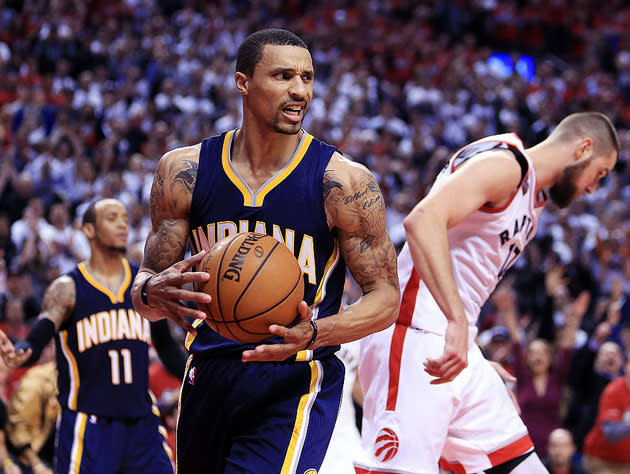George Hill learned about his trade to Utah via a voicemail from Larry Bird

The NBA moves fast. It’s a league dominated by individual players, and the resulting movement. If you’re not up on everything, you’ll fall behind; and Woj and Shams already know what you’re having for dinner. On August 18th.
[Follow Dunks Don’t Lie on Tumblr: The best slams from all of basketball]
This is why it’s understandable that Indiana Pacers president Larry Bird left a voicemail for former Pacers guard George Hill to inform him that he’d been dealt away from his hometown team and to the Utah Jazz. If Bird hadn’t left that voicemail, the thinking goes, Hill would have to hear the news via Twitter, website, a TV station’s ticker, or any number of text messages asking “Utah?”
Via 8 Points, 9 Seconds, here’s Hill’s side of things from a talk with Vigilant Sports:
After a workout, Hill first learned he was traded when he listened to a voicemail from Pacers President Larry Bird saying “we had to trade you to Utah.”
[…]
“It came as a surprise. Last time I checked, I was supposed to retire from Indiana. Very surprising, but I know this is a business and anything can happen. So, I’m not upset about it. I think I’m in a great situation here. I’m here, somewhere where I feel wanted right now.”
Again, Larry Bird had to say something, right?
He just couldn’t wait for Hill to get his 500 jumpers up, on June 22 (the trade could not become official until July 7, when the NBA’s free agent moratorium was lifted, and the cap space shifted to allow the three-team deal that also included Atlanta), because by the time George would have made it over to his phone that see that the number filed under ‘Larry Legend’ had dialed up, unending text messages would have shown up informing him that he is due to play in Salt Lake City for the next season.
Then, you remember Larry Bird’s history with these sorts of things.
Larry Bird, famously, walked away from millions upon retiring from life as an active player in 1992 – had he waited a few more weeks, his upcoming 1992-93 salary would have become guaranteed regardless of his playing status. On the flip side of that, though, was the implementation of NBA ‘Bird Rights’ in 1984 – the league bent the salary cap rules mainly so Larry Bird could remain a Boston Celtic. Flipping that over yet again was Bird’s anti-player’s union, anti-Bird Rights stance during the 1998-99 NBA lockout.
As Ben Gibson at 8 Points, 9 Seconds reminded us, Bird hasn’t exactly seen some of his employees off in the classiest ways since taking over the Pacers during the summer of 2003.
It can certainly be argued (especially in the first case) that Isiah Thomas, Frank Vogel, Roy Hibbert or even George Hill had to go for the betterment of the franchise. Still, Bird let Thomas dangle for weeks upon taking over the club. Bird told a room full of reporters, records and cameras that Frank Vogel essentially begged for a new contract with Indiana under the guise of, “well, hell, he really does love the Indianapolis community.”
Bird basically called out Roy Hibbert as a non-factor following a disappointing 2014-15 season, not only needlessly slamming the center but also hamstringing Indiana’s trade leverage (they would only get a heavily-protected 2019 second round draft pick in return) for a player that was an All-Star just 17 months before.
Former Pacers forward David West, perhaps the most-respected class act this league has to offer, took umbrage with the Hibbert handling (and, a year later, the Vogel press conference) and gave up $11 million in order to leave Indiana and join the San Antonio Spurs on a veteran’s minimum salary.
There is a difference, as we’ll see this week in Cleveland, in “telling it like it is,” and “telling it as one should.” The George Hill situation might not be an instance of such, but if Larry Bird doesn’t feel like texting (as is the preferred, much to the consternation of many old pieces of coal like myself, contact method of the day) “you need to call me as soon as you see this” to Hill, then he should have found someone that can handle that role.
Larry Bird traded a future MVP candidate for George Hill, and a voicemail cannot be the ideal way to hear that you’ve been traded from your hometown team.
Silver linings, for both sides? Sure. Bird probably made an upgrade in bringing yet another Indianapolis product, the presumably-healthy Jeff Teague, in during the final year of his contract, in for Hill. And Hill should flourish in Utah; he comes straight out of central casting for the team that appears to be on everyone’s lips as we head into 2016-17. And, again, we don’t know if this is another example of Larry Bird kind of muddling up another awkward goodbye. He probably had Hill’s best interests at hand.
What we do know, in the wake of the Hibbert/West/Vogel (and possibly Hill) separations, is that Legend has a little work to do when it comes to telling an employee that his entire life is about to change.
– – – – – – –
Kelly Dwyer is an editor for Ball Don’t Lie on Yahoo Sports. Have a tip? Email him at KDonhoops@yahoo.com or follow him on Twitter!

 Yahoo Sports
Yahoo Sports 

